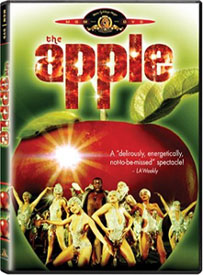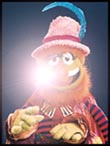 My interest in The Apple since I first saw it on CBS late-night in '86 (with about 30 minutes cut out to make way for more auto insurance commercials) can only be described as obsessive. I probably watched my badly-cropped VHS copy 200 times in the few months after that initial viewing, listened to the soundtrack (which by some fluke I found at a flea market a few weeks after first seeing the film) just about every day, and even went as far as starting to write a sequel, complete with songs (composed on a small Casio) and press kit (courtesy Print Shop™ – on an Apple II, suitably enough). For years I hounded everyone I know into watching the movie. I started a semi-rage at my junior high by distributing 'BIM marks,' which for a brief moment replaced charm bracelets as the must-have fashion accessory. For New Year's Eve 1994, I insisted, at a party populated mostly by strangers, that everyone quiet down and watch The Apple at midnight – come on, it was a once-in-a-lifetime opportunity, far more so than the turn of the millennium five years later. The world will probably never bear witness to The Apple II, or the "Director's Cut" I frequently fantasize about, or the all-star shot-for-shot remake I would direct if I had $70 million to blow and six months to live. I suppose it is enough that we have The Apple at all – without question the longest-ignored, most insane, and straight-up best "bad movie" of all time – now preserved on DVD in crystal-clear widescreen, and prints showing theatrically at midnight across the country, displacing Rocky Horror, as I always believed it must. The extreme pleasure of The Apple is best summed up in one phrase: "Futuristic musical set in 1994." That alone sets it apart from the pack, especially given that 1994 has come and gone and none of the paranoid governmental developments envisioned by the movie have come to pass. Yet 1994, in my mind, shall always exist as depicted in The Apple; that is, as 1980 Gay Berlin. I hesitate to reinforce the "bad movie" aspect of The Apple, because while it is ill-conceived on every level, and even when it's trying to be funny, it's not funny for the reasons it thinks it is, it is still more endlessly watchable than Citizen Kane. Though you have to use a different part of your brain to access The Apple as something you ought to spend your time watching, I'd argue that unlike most "bad movies," The Apple actually demands repeat viewings, moreso than Playtime or any genuine classic you can name. It's not "so bad it's good" … it's just SO FUCKING GOOD. The story centers around Alphie and Bibi (George Gilmour and Catherine Mary-Stewart), "a couple of kids from Moosejaw," who come to the attention of nefarious record producer Mr. Boogalow (Vladek Sheybal) after nearly winning the 1994 WorldVision Song Competition out from under Boogalow's star act, Pandi and Dandi (Grace Kennedy and Allan Love). Boogalow runs BIM (Boogalow International Music), the company that can make or break any act, and which somehow controls the government as well. During a press conference wherein Alphie and Bibi are to sign their contract with BIM, Alphie receives a horrifying vision of Boogalow as Satan, his assistant Shake (Ray Shell) as the devious snake, and the contract-signing as biting the forbidden Apple. The Biblical imagery is ridiculous, and not especially well-executed, either (are Vampires religious symbols?). But the fact that this all serves to set up a perfectly insane song-and-dance number (with loincloth-clad Dandi holding a gigantic apple in his hand) renders you powerless to disengage. Wide-eyed Bibi signs the contract (and, implicitly, her soul) to BIM, while cynical Alphie goes off to live in poverty, unable to sell his nostalgic music (remember, this is 1994, "love songs are out"). Hey, wait – I just realized that love songs were out in 1994. Hm, well that's about the only thing this movie predicted correctly. The Apple's vision of the future contains the requisite monorails and shiny foil uniforms, as well as the BIM symbol being incorporated into virtually everything, by government decree. There are BIMburger stands, BIMball machines, BIM strollers, BIM shields used by the police, and of course, BIM marks – stickers of the BIM logo that all citizens are forced to wear on their bodies. (!) A prescient statement on corporate conglomeration and dehumanization? Not intentionally. Perhaps Menahem Golan would argue that the BIM mark is no different from the Nike logo, but the Nike logo has never been as ridiculous as the BIM mark is in virtually every appearance it makes in The Apple. Although the BIM mark will never have been as ridiculous as when I actually get one tattooed on my body, which is bound to happen sooner than later. The best BIM endeavor, though, is the "National BIM Hour," a daily hour of "exercise" set aside by the government wherein every citizen must compulsorily break into spontaneous dancing while the "BIM'" theme song blares over loudspeakers all around. This scene is probably the most riotously baffling in the whole film, depicting firefighters and surgeons stopping their work so they can do choreographed dance routines. Absolutely priceless. Overnight, Bibi becomes a big BIM star (her hit single is the incredible "Speed," literally about the drug, and sounding a lot like if Bonnie Tyler had to score a snuff film), and Alphie degenerates into a depressed lifestyle relieved only somewhat by his mothering landlady (the always enjoyable Miriam Margoyles). Eventually, Alphie joins a cult of "refugees from the 60s, commonly known as Hippies," and Bibi follows him, much to the dismay of Boogalow and his henchman Shake (Ray Shell, incidentally, manages to be singlehandedly more over-the-top than the film itself). This leads to a showdown between Boogalow and his evil corporate minions, and the Hippies, who are rescued in one of film history's most staggering out-of-nowhere plot twists, by "Mr. Topps" (Joss Ackland), who descends upon earth in a glowing Rolls-Royce and suddenly makes the Biblical theme explicit as he confronts Boog. A literal deus ex machina. Topps leads the Hippies (and even some converts from Boog's side, including Pandi) INTO THE SKY, where he will relocate them to a new planet free from Boogalow's "pollution." It is one of the greatest endings to a movie ever devised, clearly aiming for a Grease vibe but unable to figure out if it is going for sheer pandemonium or utter self-righteousness. Which, of course, makes for unbeatable entertainment.
In between all this hogwash, there are crazy-catchy songs (the reggae-lite "How to Be a Master," the disco-trash "Coming") fleshed out as full-on production numbers – the highlight is probably "Showbizness" ("Life is nothing but showbizness in 1994!"), performed by Boogalow with "Dick Diabolov and Ballet 2000" (with a very brief, uncredited shot of Yma Sumac!). My current favorite bit of Apple dialogue is from this scene: Alphie: "What are you, a clown?" Though I've certainly spent enough time trying, it's impossible and pointless to put into words how absolutely weird and triumphantly retareded this movie is, but just when you think it can't get any more bizarre or baffling, the next scene easily tops the last. Golan's fiercely literal direction is laughable, but one of the film's most enjoyable aspects. Alphie sings "You've got me with my back against the wall" – yes – with his back against a wall; Boogalow sings "Man is clinging to the ropes of the fantasies and hopes we are dangling" – yes – while dangling a small noose. And every time I watch The Apple I catch something new (this time it was the unexplained station wagon labeled "Vacuum Busters" – in fact, most cars in "the future" are apparently modified late-70s station wagons). I can't recommend it enough. Kudos to MGM for doing a proper video release, to bring the magic to the masses, even though part of me wishes I could still have it all to myself. But The Apple is bigger than me; indeed, it is bigger than us all. In its infinite artlessness, The Apple is humankind's greatest work of art.
Review by |

